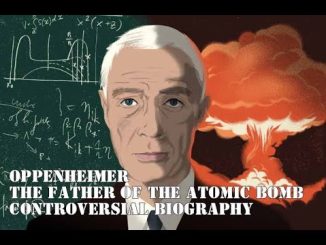Il semble que nous ne pouvons pas trouver ce que vous cherchez. Peut-être que cette recherche peut vous aider.
Rien de trouvé
Articles récents
-

J. Robert Oppenheimer, often hailed as « the father of the atomic bomb, » was a brilliant American theoretical physicist whose life and legacy remain steeped in both triumph and controversy. Born on April 22, 1904, in New York City to a wealthy Jewish family, Oppenheimer displayed an early aptitude for science, graduating summa cum laude from Harvard University in 1925 with a degree in chemistry before earning his doctorate in physics from the University of Göttingen in Germany in 1927 under Max Born. His academic career flourished as he joined the faculty at the University of California, Berkeley, and the California Institute of Technology, where he made significant contributions to quantum mechanics, including the Born-Oppenheimer approximation, and laid foundational work in astrophysics, such as predicting the existence of black holes decades before their confirmation.
Oppenheimer’s most defining chapter began in 1942 when he was appointed scientific director of the Manhattan Project by General Leslie Groves. Tasked with leading the Los Alamos Laboratory in New Mexico, he oversaw a team of thousands in developing the world’s first atomic bombs during World War II. His leadership culminated in the successful Trinity test on July 16, 1945—the first nuclear explosion—followed by the bombings of Hiroshima and Nagasaki, which killed over 200,000 people and ended the war with Japan. Reflecting on the Trinity test, Oppenheimer famously quoted the Bhagavad Gita, saying, “Now I am become Death, the destroyer of worlds,” a statement that encapsulated his complex emotions about the weapon he helped create. While initially celebrated, with appearances on the covers of Life and Time and a Medal for Merit from President Truman in 1946, his triumph was shadowed by moral turmoil. He later expressed regret to Truman, saying, “I feel I have blood on my hands,” a sentiment that infuriated the president, who dismissed him from the Oval Office.
Post-war, Oppenheimer’s career took a dramatic turn. Appointed chairman of the General Advisory Committee of the Atomic Energy Commission (AEC) in 1947, he advocated for international control of nuclear weapons to prevent an arms race with the Soviet Union and opposed the development of the hydrogen bomb, a stance that clashed with Cold War hawks like Edward Teller and AEC chairman Lewis Strauss. His earlier associations with communist sympathizers—though he never joined the Communist Party—combined with his anti-H-bomb position, made him a target during the McCarthy-era Red Scare. In 1954, a security hearing stripped him of his clearance, a decision widely seen as unjust by the scientific community, effectively ending his political influence. The ordeal, detailed in Kai Bird and Martin J. Sherwin’s Pulitzer-winning biography American Prometheus, painted him as a martyr of anti-intellectualism and political paranoia. It wasn’t until 2022 that the U.S. Department of Energy vacated this revocation, acknowledging the “bias and unfairness” of the process.
Oppenheimer’s legacy is a paradox: a genius who reshaped history through nuclear power, yet a man haunted by its consequences. After the hearing, he retreated to the Institute for Advanced Study in Princeton, directing it until 1966, fostering interdisciplinary research alongside figures like Albert Einstein. He died of throat cancer on February 18, 1967, at age 62, leaving behind a contested narrative. Celebrated in works like Christopher Nolan’s 2023 film Oppenheimer, which won multiple awards, he remains a symbol of scientific brilliance and ethical ambiguity—a man who gave humanity the power to destroy itself, then spent his life grappling with that gift.
#Oppenheimer
#atomic_bomb
#atomicheart
#atomicstructure
#atomicmass […] -

-

-

-

Articles populaires
-
 Nous allons te donner des algorithmes à réaliser, à toi de les programmer avec Algobox ! Il est fortement conseillé d’avoir lu le cours sur l’algorithmie avant de faire les exercices. Nous te donnons des indications après [...]
Nous allons te donner des algorithmes à réaliser, à toi de les programmer avec Algobox ! Il est fortement conseillé d’avoir lu le cours sur l’algorithmie avant de faire les exercices. Nous te donnons des indications après [...] -

-

-

-

